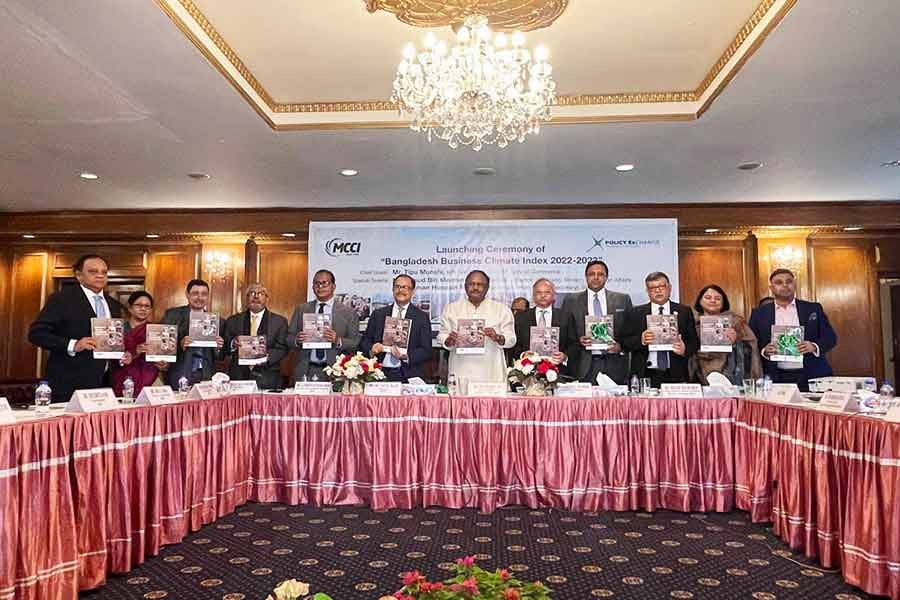The recently released findings by the Bangladesh Business Climate Index (BBX) suggest no worthwhile improvement in the country's overall business climate, save slight advances in few areas. The BBX, the other name as the World Bank had dubbed Ease of Doing Business was first launched in 2021 after the WB stopped publishing its Ease of Doing Business Index. Now the Metropolitan Chamber of Commerce and Industry (MCCI) and the Policy Exchange of Bangladesh, a private think tank, are jointly engaged in preparing the index, in keeping with the format of the WB.
The findings are not comprehensive given the short period under review and the sector of businesses covered. However, what has transpired in 2022 compared to the previous year is that the aggregate score improved only marginally from 61.01 to 61.95 out of 100. "This reinforces the fact that no significant reform initiatives were undertaken in the past one year resulting in insignificant improvement," according to the BBX survey report.
The BBX estimation was based on 518 qualified responses in July-September period 2022 on 10 major pillars or categories. These are: starting a business, access to land, availability of regulatory information, infrastructure, labour, dispute resolution, trade facilitation, paying taxes, technology adoption, and access to finance.
In terms of performance, access to finance emerged as the most hostile business factor with 35.22 points followed by access to land (53.07 points) and paying taxes (55.21 points). The points of these three areas were 50.78, 58.90 and 68.72 respectively in the BBX previous edition's score.
On the other hand, as regards improvements, infrastructure with 74.49 points topped the list followed by labour (74.40), availability of regulatory information (72.85), starting a business (70.78), dispute resolution (64.24), technology adoption (60.60) and trade facilitation (58.61).
Sharing the findings of the survey, Chairman of the Policy Exchange of Bangladesh Dr. M. Masrur Reaz said seven out of 10 areas made progress but three others experienced large drop. Based on the business perception, he said Mymensingh topped among the divisions which goes to explain that Dhaka and Chattogram have apparently ceased to be the first two business spots. Isn't it too premature to make such a forecast at this stage?
Meanwhile, in the just released World Economic Forum (WEF)'s Executive Opinion Survey the picture is not at all reassuring. The study was as part a global survey conducted by the WEF on 11,800 respondents from 121 economies from April to July of 2022. In Bangladesh, the Centre for Policy Dialogue (CPD) conducted the survey. The respondents represented private companies in agriculture, manufacturing and services sectors based in Dhaka, Chattogram, Narayanganj and Gazipur.
The top three risks facing the country in the upcoming years, according to the survey, are cost-of-living crisis, employment and livelihood crisis, and infectious diseases. Most of the indicators in the financial sector showed lower scores in 2022 compared to 2021, said the survey report, as the level of performance of the financial sector remained negative indicating a struggling situation as in the previous years. A negative perception was observed in the case of the soundness of banks, accessing start-up capital, and financial and auditing report standards.
"The financial sector needs major overhauling," said CPD Research Director Khondaker Golam Moazzem while making a presentation on the findings of the survey. The overhauling, he explained, could be initiated as part of meeting the loan conditionality of the International Monetary Fund and amending the Bank Company Act and by way of lifting the cap on lending rates and ensuring an effective oversight role of the central bank, the Bangladesh Securities and Exchange Commission, and the Insurance Development and Regulatory Authority.
The survey report has attributed much of deteriorating business environment in 2022, compared to the previous year, to corruption. Overall, 64.6 per cent of the respondents complained about the high level of corruption seriously affecting business. Weak institutions are also blamed as the most challenging barriers to doing business in the country. Improvement of institutions has been found to be sluggish and most importantly, public entities dealing with taxes, licences, public utilities, judicial system, export and import performed poorly in the period under review. Performance by the majority of infrastructure-related facilities has been stated to be below the average level despite major public investments in key infrastructures.
The major lessons for Bangladesh from the Sri Lankan debt crisis, as mentioned in the report, were to avoid undertaking unnecessary large projects, promote export diversification, avoid taking up bulk loans from a single lender, and attract private investment. The report highlighted a number of adverse impacts on the economy due to the Russia-Ukraine war, namely the rising cost of production, uncertainty in the import of final goods, higher cost of imported raw materials and the difficulty in international transactions.
As regards foreign direct investment, the report stated that despite various initiatives, FDI inflow remained at a low level. "A lack of proper infrastructure, the limited functionality of one-stop service facilities and weak financial reporting of local companies are considered as drawbacks for attracting FDI", the report said. As regards the deterioration of competitiveness of the business environment in 2022, respondents considered that the corporate businesses are dominated by a few groups of companies as in the previous years.
No doubt the Executive Opinion of the WEF, illustrated through the survey, is far grimmer that the BBX survey-the latter a bit conciliatory, though not reassuring. If the reality is so grim, there is no point trying to enliven it with vague optimism. After all, recognising the reality is wiser than passing over the downsides in order to be able to work on them for improvement.
wasiahmed.bd@gmail,com


